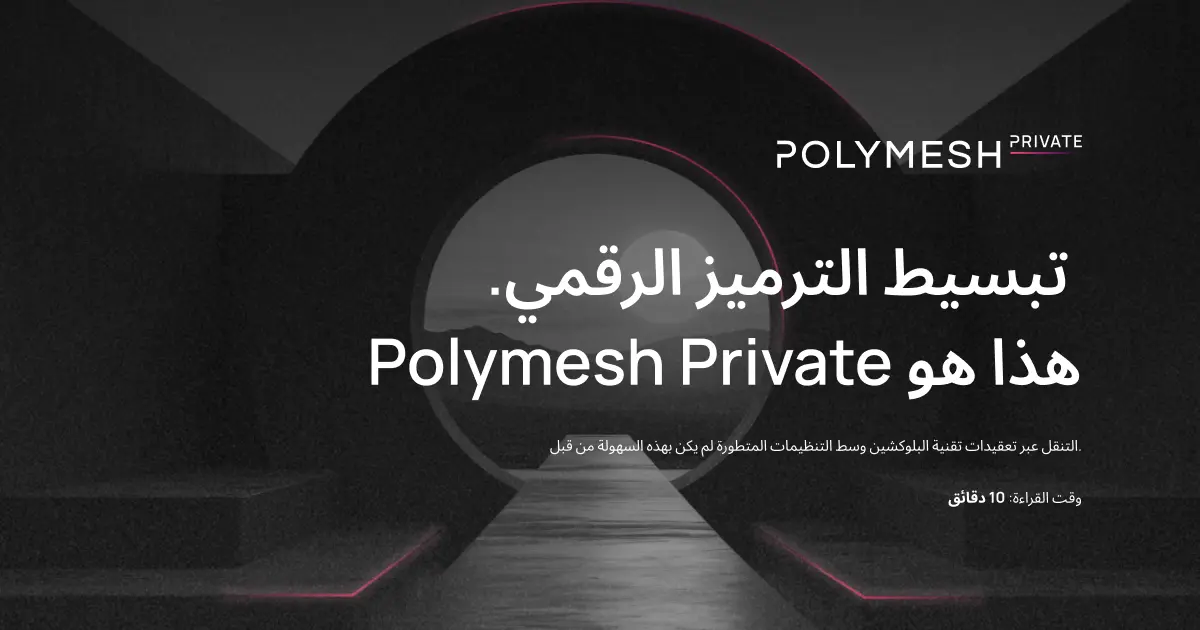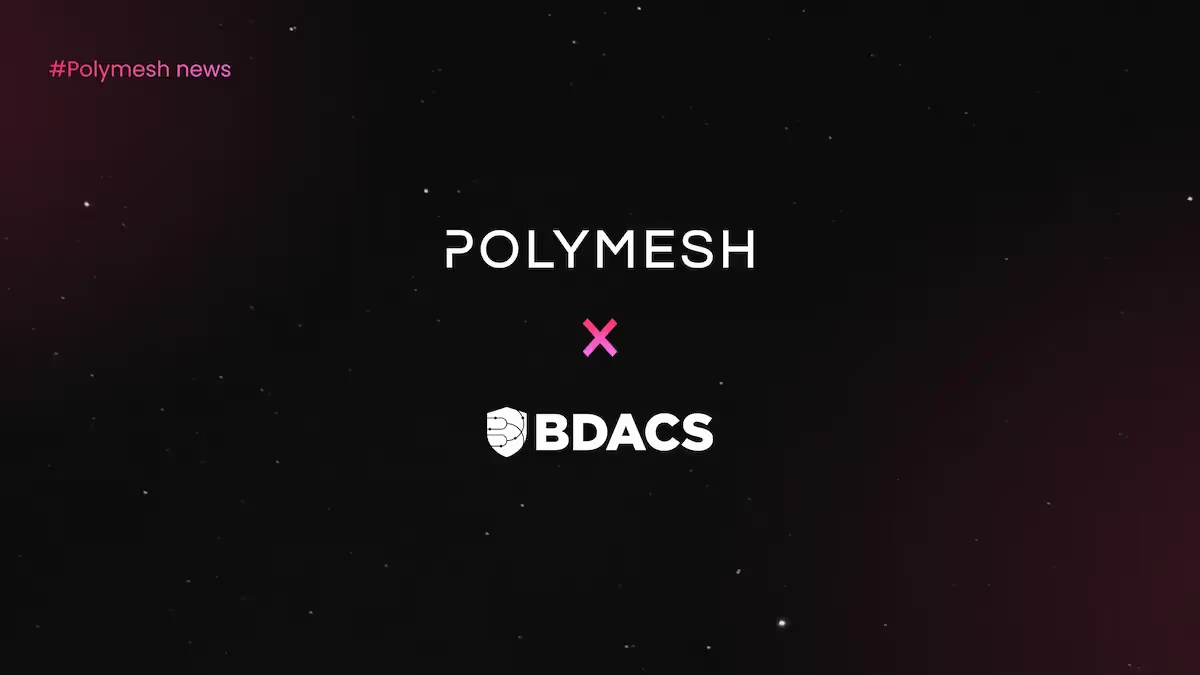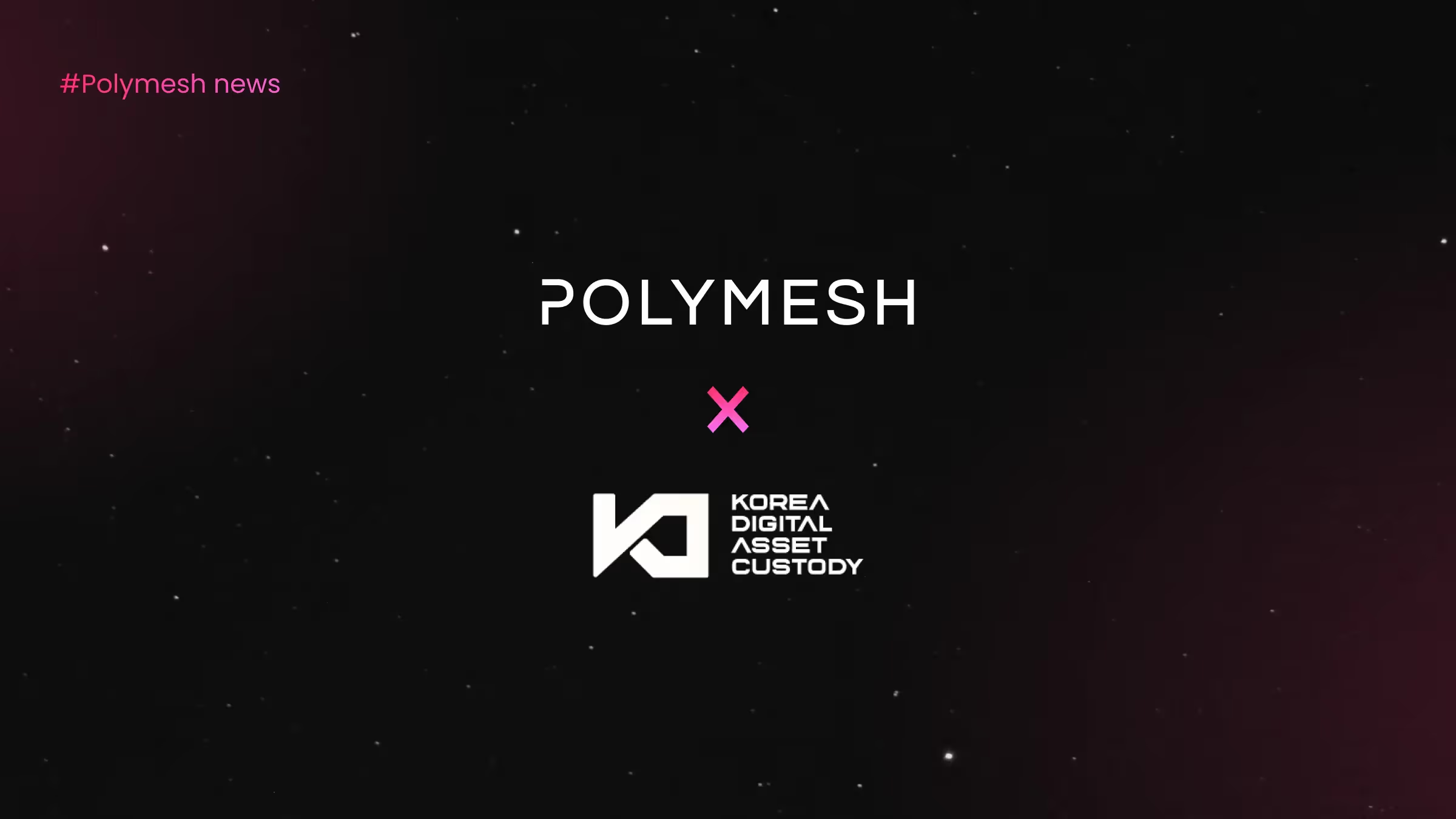Insights from Busan: the next major blockchain hub?
Korea’s tokenization market is heating up. We’re not surprised, as Korean companies and crypto enthusiasts have long supported Polymesh’s mission to transform securities through asset tokenization.
Tokenization is often in the corner at crypto-centric events—it’s less glitzy, less novel, and too ‘TradFi’ compared to colorful new layer-ones and dApps. Our recent involvement at Korea Blockchain Week and Blockchain Week Busan proves that tokenization is finally getting the spotlight it deserves.
Our CEO, Bill Papp, had the chance to attend both events and interact with numerous domestic and international blockchain experts. He also represented the Polymesh Association at a signing ceremony for a strategic partnership with BDACS that took place this week in Busan. This partnership is expected to contribute to the activation of the Busan Digital Asset Exchange by listing and trading various promoting RWA products. This collaboration has been proposed as the RWA technology model for the exchange.
From our insights and experience on the ground, it’s clear that South Korea’s vibrant coastal city, Busan, is well on its way to realizing its dream of becoming a global blockchain hub, with tokenization as the magic carpet.
Here we summarize some highlights from BWB 2024 and provide readers with a rich overview of how Korea’s second-largest city, Busan, is becoming a blockchain hub on par to rival the capital, Seoul, as well as other international finance hubs.
Highlights from Blockchain Week Busan 2024
Held in Haeundae-gu for two days, Blockchain Week Busan is organized by Busan in partnership with local companies, including the Busan Digital Asset Exchange. The event promotes urban innovation and digital assets, facilitating discussions to advance innovation and foster cooperation in blockchain technology.
Polymesh and BDACS sign strategic partnership
The Polymesh Association was proud to participate in a signing ceremony at BWB 2024 with leading blockchain and digital asset custody company BDACS, a local Busan company driving the growth of digital assets in the region.
Polymesh Association CEO Bill Papp and BDACS CEO Hong Yul Ryoo, alongside various representatives of both organizations, attended the signing ceremony at the Grand Chosun Hotel. The signing formalized a strategic partnership between BDACS and the Polymesh Association to support the discovery and development of promising real world asset (RWA) projects. Learn more here.
Busan Digital Asset Exchange ceremonial launch
The Busan Digital Asset Exchange (BDX), set to go live later this year, unveiled its brand and operational methods for decentralized real world asset (RWA) and security token offering (STO) exchanges. The launch ceremony has been eagerly expected by the local industry following the exchange’s completion of capital payment in May 2024.
The announced details provide insights into the future of digital assets trading. The Busan Digital Asset Exchange is 100% operated by private capital but with guaranteed support and fairness from the Busan Metropolitan Government, granting investors enhanced reliability. This model is similar to Japan’s Osaka Digital Exchange, which opened late last year.
Launch of Asian Representative Digital Asset Exchange Alliance
The Busan Digital Assets Exchange will further increase reliability through the launch of a security token alliance with leading digital exchanges in Asia, which also took place this BWB 2024.
Officially formed at BWB 2024 was the “Asian Representative Digital Asset Exchange Alliance.” Members include Busan’s Digital Assets Exchange as well as Japan’s Osaka Digital Exchange, the Malaysian government-approved digital asset exchange GreenX, Mekong Digital Asset Exchange (MKEX) in Cambodia, TokenX, a subsidiary of Thailand’s largest fintech group, and Singaporean platform ADDX.
The Alliance highlights a commitment to the joint goal of expanding the digital asset market, responding to international regulations, and cooperating in information and technology to further innovation while protecting consumers.
How is Busan becoming a blockchain hub?
Various factors reinforce Busan’s potential to develop into a global blockchain innovation center, where blockchain technology is integrated into various sectors including government services, logistics, healthcare, and finance.
Busan as a Regulation Free Blockchain Zone
Busan’s status as Korea’s only blockchain ‘regulation-free’ zone holds unique value for the industry, facilitating the development, testing, and implementation of blockchain technology with reduced regulatory constraints. Local financial institutions and private companies have poured over $100 billion Korean won (~$75m) into blockchain development via the city’s “Blockchain Innovation Fund.”
The city is establishing a “Blockchain Innovation Zone” providing infrastructure and resources for startups including financial incentives, subsidies, and a proliferation of coworking spaces and events—such as Busan Blockchain Week—to foster collaboration and attract top talent. The city’s partnerships with universities aim to shape a skilled future workforce that can further maintain and develop the sector through blockchain education, training programs, and research funding.
These zones promote the research and development of blockchain technology in a friendly regulatory environment, helping attract businesses and investors by reducing bureaucratic red tape and facilitating smoother operations. The regulatory freedom in the zone is ultimately a win for regulatory clarity overall, as the city can translate what’s happening in the zone into the construction of a clear regulatory framework. To this end, Busan’s municipal government is working with national authorities to establish policies that balance encouraging innovation with consumer protection.
Busan as a Blockchain City
Busan’s “Blockchain City” project includes plans to develop a public blockchain network interoperable with platforms like Ethereum and Cosmos that will unify various services into a single citywide system, enhancing service delivery and accessibility for residents.
Previously, Busan explored various use cases of blockchain technology in its trade-free zone on different networks, leading to issues in interoperability and a disjointed user experience. Now city officials are focused on creating a public blockchain network compatible with global counterparts, with a technology standard spearheaded by the Korea Internet & Security Agency. This standard, the Blockchain Trust Framework, will be applicable to public services within Busan City.
Busan has been exploring the use of blockchain to improve transparency and efficiency in public services, such as document verification and public records management. Use of decentralized identifiers enables residents to authenticate themselves anonymously when accessing public or private services, or securely store important documents like driver’s licenses and university certificates on mobile devices. Busan is also implementing blockchain in healthcare to manage patient data securely and improve interoperability among healthcare providers.
Busan Digital Asset Exchange (BDX)
What really cements Busan as a major blockchain hub is its city-supported exchange, a collaboration between the Busan Metropolitan City, blockchain technology companies, and established institutions.
Originally, Busan had plans to launch a cryptocurrency trading platform favoring digital currencies like Bitcoin (BTC) and Ethereum (ETH), but there were regulatory complications. These plans were shelved in favor of a digital assets exchange, the Busan Digital Asset Exchange (BDX), launched at BWB 2024.
Initially, the exchange will focus on trading tokenized commodities such as precious metals and raw materials, with plans to expand offerings to include other digital assets and tokenized securities including tokenized intellectual property, gold, carbon emissions trading, and real estate. Reports indicate that tokenized equities and bonds may also be eligible for trading on the exchange, although these financial instruments were earlier understood to be excluded.
Unlike other jurisdictions focusing on accredited investors and institutions, BDX will cater to retail investors by facilitating the 24/7 trading of various high-value assets in smaller units through tokenization and fractional ownership.
The Busan Digital Asset Exchange aims to become a leading company in Busan’s special blockchain zone, driving the growth of Busan’s blockchain industry and status as a global digital assets hub. As the first anchor company in the Busan Opportunity Development Special Zone (Finance), it plays a vital role as the expected foundation for the first wave and likely many more future digital assets and security token trading projects to appear in Busan in coming years.
BDX Consortium
After considering various crypto exchanges, Busan City chose the BDX Consortium led by ITCEN GROUP to establish the Busan Digital Asset Exchange (BDX) specifically for tokenized real world assets (RWAs) and intellectual property (IP). Its 11 founders injected 10 billion won (~$7.4m) into the initiative in May 2024, setting a six month timeline for launch.
The Consortium is led by ITCEN, a listed IT consultancy with experience operating a gold digital asset exchange called Korda. Other major backers include Hana Bank and Hana Securities, Main Street Ventures, NHN Cloud, Barunson, OCON, Optimus Block Korea, and Withers Partners Korea.
Decentralized Governance
BDX will operate under a decentralized governance framework that will handle securities settlements, listing assessments, and market monitoring. This structure aims to ensure investor protection and enhance public ownership by separating key functions to ensure checks and balances. The city of Busan will provide administrative and financial support to ensure it adheres to high investor protection standards.
There are concerns that decentralized governance may limit opportunities for local companies in Busan to participate, potentially favoring external or governmental interests. It will be up to Busan City to promote local ownership and benefits while encouraging the Consortium to strengthen ties to the local community. The involvement of local Busan companies in the BDX Consortium will be vital for addressing local issues and incorporating community feedback.
What types of assets will be tokenized in Busan?
With BDX, Busan plans to integrate blockchain in a regulatory-friendly manner while fostering local industries and playing to its strengths. As such, BDX will prioritize tokenizing assets that are reflective of the city’s thriving industrial sectors and boost the local economy.
Commodities
Local media indicates the first wave of assets tokenized via BDX is likely to be tokenized commodities.
As Korea’s primary trading hub, Busan is uniquely positioned to facilitate transactions of agricultural products such as grains, livestock, and fishing, precious metals such as gold and silver, and energy derivatives.
Tokenizing these products can help to lower transaction costs, streamline asset management, and enhance market liquidity, as well as generate jobs across various sectors. It can also enhance wealth distribution, encouraging economic growth and stability, and improve the efficiency of markets, ultimately leading to more fair prices and reliable access for buyers.
Intellectual property assets
Another asset type expected to be tokenized widely via BDX are intellectual property assets, specifically related to film and gaming rights. Busan has major prominence in the entertainment and gaming sectors in Korea, notably through the prestigious Busan Film Festival, currently planning its 30th edition, and G-Star, a major annual gaming exhibition.
Film rights
Tokenizing films converts film assets, their rights and revenue streams into digital tokens, facilitating film financing through fractionalized ownership. Inventors—who may just identify as ordinary movie fans—can participate in token offerings, crowdfunding campaigns, and later trading. Profits from ticket sales, streaming platforms, merchandise, and other channels are distributed to token holders automatically via smart contracts.
The Korean cinema market, widely popular internationally, is projected to grow to US$2.9b by 2029. Despite having numerous film schools, a studio, and a film festival, Busan hasn’t been able to capture much of the filmmaking industry because it lacks the conditions that allow film industry professionals to live and work there: jobs.
Tokenization of film rights on the BDX exchange will help create the economic infrastructure required to bring filmmakers and other film professionals to Busan, driving funding to film projects taking place in and outside of the city and enabling bigger budgets capable of supporting film production and attracting talent.
Gaming assets
By tokenizing gaming rights, Busan can help drive funding to incubate local game startups and attract some of the talent that attends its annual G-Star event, finally breaking into the bigger market. Incorporating tokenization into the gaming experience can also help to encourage deeper player involvement, helping prolong game lifespans and fuel innovative development.
In 2021, many companies at G-Star were seen to have ventured into the blockchain gaming market with established dedicated Web3 teams. Tiger Research reports that while fewer companies have explicitly mentioned blockchain at the past few G-Star events, marking a strategic retreat, pioneers in the B2B exhibit remained committed actively developing the blockchain gaming market—and the retreating players were watching them with intent to later follow.
Encouraging blockchain development in conjunction with gaming will help companies in Busan offer more immersive experiences, from play-to-earn (P2E) models, NFTs, and decentralized economies to experiments like NEXON is doing with Maple Story. In September 2024, the company announced its intention to go beyond in-game currency and utilize blockchain to facilitate game processes driven by market influence, instead of a centralized entity.
Ships and maritime finance
Busan is already utilizing blockchain to enhance logistics and international trade, improving supply chain transparency and digitizing trade-related data, such as tracking the movement of containers between terminals. Leveraging Busan’s status as Korea’s main port, BDX will seek to further Busan’s use of blockchain in the trade industry by focusing on tokenized ships and maritime finance.
Korea’s shipbuilding industry is ranked 5th among national exports but faces difficulties in practical financing. While a profitable industry, this profit isn’t seen by shipbuilding firms until ship delivery. Public participation in maritime finance is also limited to public equity markets and restricted by high investment minimums.
Tokenization of ships and other maritime assets will enable small-scaled diversified investment and new means to financing that secure the cost for shipbuilding, raise jobs in shipbuilding years, secure cargo volumes of shipowners, and open maritime assets for broader global investment. Several companies are accelerating use of security tokens for shipbuilding, such as HSJC and ShipFinex, who announced a September 2024 partnership with Tokeny for tokenized maritime assets.
How is Busan using partnerships to connect to the broader ecosystem?
As demonstrated by the establishment of the Asian Representative Digital Asset Exchange Alliance (see above), BDX is preparing for further digital assets transactions through strategic partnerships with international exchanges, including the Osaka Digital Asset Exchange (ODX) and Malaysia’s GreenX. The dominance of APAC nations in these partnerships points to an overall trend of regional efforts to innovate in the digital asset space.
These alliances with blockchain-friendly regions to share knowledge and best practices enhance BDX’s global presence in the blockchain ecosystem.
BDX’s individual partnership with GreenX, for example, will leverage respective strengths to mutually enhance customer service and establish a world-leading digital asset exchange ecosystem. The two companies will share experiences, know-how, and networks, and expand customer and product bases through the establishment of a consultative body. By strategically partnering with GreenX, a subsidiary of the Nasdaq-listed Green Pro Capital and certified Sharia-compliant business with global clientele, BDX gains exposure to 1.9 billion potential customers in Southeast Asia, the Islamic market, and China.
Additionally, BDX has a memorandum of understanding (MOU) with Bitgo, the largest digital asset trustee globally, to enhance digital assets transactions. The MOU emphasizes mutual cooperation in the storage and transaction of digital assets and RWAs.
Outside of BDX, Busan City has a strategic partnership with Huobi’s South Korean entity to enhance the city’s infrastructure and nurture local talent, aspiring to compete in Web3 leadership with established finance hubs like Hong Kong and Singapore.
Existing partnerships formed when the city was planning to develop a digital currencies exchange reportedly remain intact despite the shift towards focusing on asset tokenization. These partnerships boast names of well-known global exchanges including Binance, Gate.io, Huobi Global, and Crypto.com.
How is becoming a blockchain hub improving the local economy?
With a population of ~3.4 million, Busan is Korea’s second largest city, but like the rest of the country faces the democratic challenge of a shrinking workforce population and low birth rate.
Busan’s aggressive encouragement of blockchain is responding to this challenge. Cryptocurrency popularity in Korea is driven by the potential for wealth creation, especially by younger individuals as they face high unemployment and inflation—the same factors influencing the declining birth rate, said to be the lowest in the world.
The establishment of the BDX as a global company and representative exchange for Korea and Busan, as well as Busan’s “Blockchain Innovation Zone” and other city-driven initiatives, create both tangible and intangible economic benefits. Fostering the blockchain industry in Busan will create new jobs, business growth, investment opportunities, and cement Busan as a central player in both national and international digital finance.
Currently, Korea’s economic activity is largely concentrated in the capital, Seoul. Things could spread with the revival of Busan’s technology industry and focus on Web3 and digital finance, including tokenization of RWAs. Busan’s modern infrastructure in districts like Haeundae, where BWB 2024 took place, make the coastal city an attractive location for blockchain enterprises—especially combined with the friendly regulatory environment, government-backed employment subsidies and funding, flexible work policies, and a collaborative approach that sees city officials keen on uplifting voices from startups and smaller companies.
Wrapping up: Busan within a wider context of digital asset development
Korea has an affinity for novel technology and innovation, so it’s no surprise that its cities are leading some of the most impressive environments for blockchain development and integration.
Outside of Busan, several South Korean banks and securities firms are developing their own tokenization platforms and forming industry alliances. Hana Securities, one of the firms in the BDX Consortium, is planning to launch its solution in late 2024. Most of the country’s major banks have joined various security token alliances, including Shinhan Bank, the nation’s oldest bank and equity backer of Polymesh node operator KDAC. These initiatives signal a growing interest in the tokenization sector that makes Polymesh’s involvement there even more exciting.
Within this context, Busan is positioning itself as a significant player, especially in the tokenization of real world assets. Busan’s multifaceted approach emphasizes innovation, regulatory clarity, collaboration, a supportive business environment, and education, making the city a model for others.
Busan’s locus for blockchain development will attract national and international businesses, investment, and talent, helping boost the local economy and employment while promoting growth in Korea’s digital assets landscape. The city’s strategic pivot from cryptocurrency to an exchange focused on digital assets that integrates various sectors through tokenization will further encourage local industries, also boosting Busan’s economy while contributing to the rapid convergence of traditional finance and digital assets worldwide.
Is Busan on its way to becoming a major blockchain hub? We think yes—our involvement on the ground at Blockchain Week Busan 2024 and knowledge of industry developments lends no doubt that Busan is becoming a global leader in RWA trading.
While realizing this vision fully will involve further collaboration with Korea’s national government and exerting political influence driving policies that support development, we’re keeping our eyes on the region as a soon-to-be reference point for new investment and trading methods and are excited to expand our presence there via our strategic partnership with BDACS.
Korea-based companies like BDACS and KDACS are unlocking new opportunities for asset owners and investors looking to utilize the Polymesh network.









































